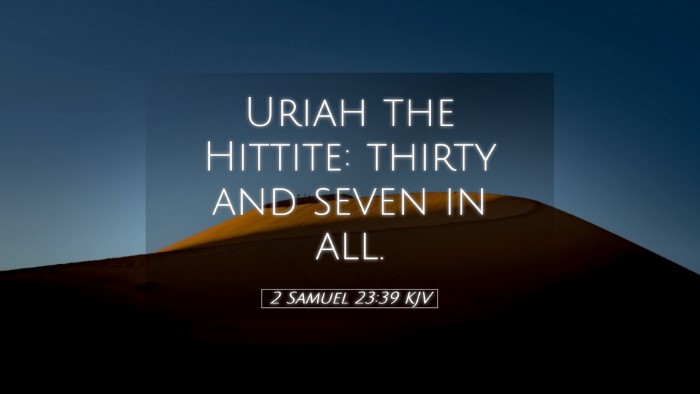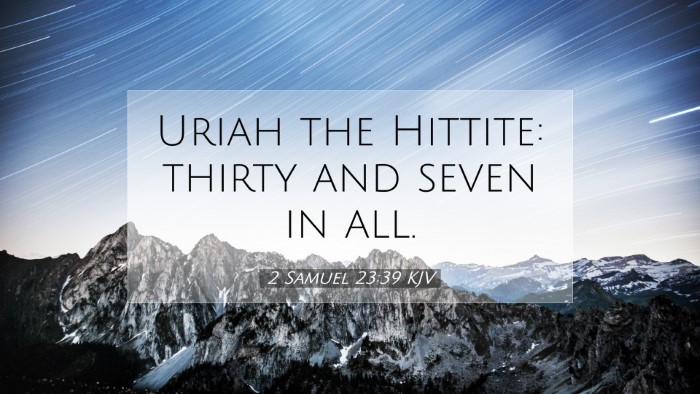Commentary on 2 Samuel 23:39
Verse (2 Samuel 23:39): "And Uriah the Hittite, thirty and seven in all."
Contextual Overview
This verse is a part of a concluding section in the Book of 2 Samuel, which showcases the mighty men who served under King David. The verses preceding this highlight the prevailing strength and might of David’s warriors, emphasizing their valor and the courage they displayed in battle.
Uriah the Hittite stands out among these formidable men, representing not only Jerusalem's defense but also a poignant narrative involving David himself. His inclusion in this list is significant as his life and death are pivotal points in David's own moral and ethical teaching.
Insights from Public Domain Commentaries
Matthew Henry's Commentary
Matthew Henry reflects on the character of Uriah and the impact of his unjust death. While many of David’s mighty men were praised for their valor, Uriah’s story evokes deeper moral contemplation. Henry presents Uriah as an exemplar of loyalty and integrity, contrasting sharply with David’s moral failures. His death at the hands of another—administered through deceit—underscores the dire consequences of sin and the ripple effects of one man’s infidelity affecting another’s life.
Henry notes that Uriah, though a Hittite and a foreigner, proved to be not just a loyal soldier but also a faithful husband. David's abhorrent act of sending him to battle on purpose, leading to his death, not only led to David’s personal downfall but served as a bleak reminder of God’s justice in temporal life. This commentary firmly establishes Uriah as a figure of righteous suffering.
Albert Barnes' Commentary
Albert Barnes offers an analysis of the significance of Uriah's military achievements. He brings attention to the fact that Uriah's inclusion in this verse portrays an acknowledgment of his bravery and capability. Barnes suggests that Uriah's tragic fate casts a shadow on David’s reign, highlighting the reality that great men sometimes obscure their integrity in the heat of passion and power.
Barnes critiques David's conduct through the lens of Uriah's valor, expressing that the king should have been leading his men instead of falling prey to personal desires. Uriah’s name is a reminder of the consequences borne of unfaithfulness, not only in interpersonal relations but also in the broader context of God's covenant with Israel. Indeed, the once mighty king becomes embroiled in sin as he orchestrates the soldier's death to cover his own transgressions.
Adam Clarke's Commentary
Adam Clarke emphasizes the historical and cultural implications of this tragic narrative. He reflects on Uriah’s status as a Hittite, signifying the crossing of ethnic boundaries in the context of Israel’s military history. Clarke presents Uriah as a man of exemplary courage—he was not merely a warrior but a symbol of loyalty amidst treachery, as he was left unknowing in David’s scheme.
Clarke further elaborates that Uriah's death is significant for understanding the subsequent trajectory of David's reign. The consequences of this act extend into the realm of prophecy, as Nathan the prophet later confronts David, setting the stage for the unfolding of divine justice. Through Clarke’s commentary, readers are urged to reflect on the weight of moral failings in leadership and the global consequences it bears on those who are innocent.
Theological Implications
This poignant account brings forth significant theological reflections. Uriah the Hittite’s life and tragic death remind believers of several essentials:
- The Nature of Sin: The linkage of David's ambition and Uriah's unwitting sacrifice indicates how personal sins can have grave implications for others, echoing themes found in James 1:14-15 about sin's progression and its deadly consequences.
- The Role of Integrity: Uriah exemplifies integrity, loyalty, and dedication. His elevation among David’s mighty men indicates that integrity and character must be held in high regard, especially in leaders. Acts of righteousness stand in stark contrast to David’s actions.
- The Providence of God: God’s sovereignty is evident, as Uriah’s legacy serves as a cautionary tale. In his injustice, God continues to work through human fallibility to bring about His will, ultimately leading to redemptive reconciliation through Christ.
- The Call for Repentance: This account serves as a call to all believers to recognize their shortcomings. David’s subsequent confession (2 Samuel 12) reflects the possibility of repentance even after grievous sins; God offers forgiveness and restoration, resonating profoundly throughout Christian theology.
Conclusion
2 Samuel 23:39 is more than a mere record of a warrior’s identity; it is a rich narrative laden with moral, ethical, and spiritual lessons. The story of Uriah the Hittite transcends his physical contributions as a soldier—it speaks to the heart of humanity’s struggle between sin and righteousness, the quest for integrity, and the profound effects of our decisions on the lives of others. As scholars, pastors, and students engage with this passage, may they glean insights that provoke not only intellectual understanding but also transformative living reflective of Christ’s love and call to holiness.


